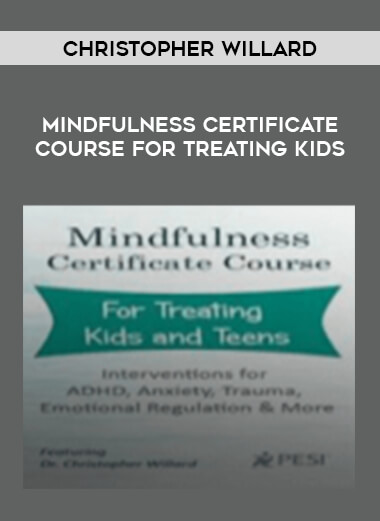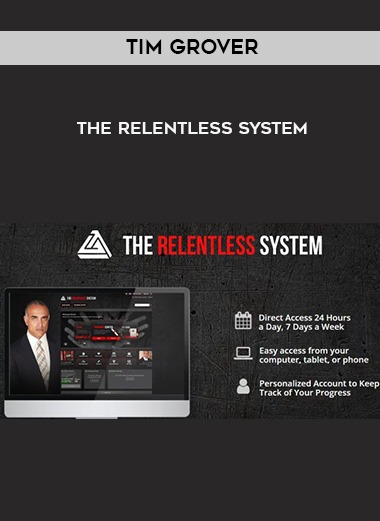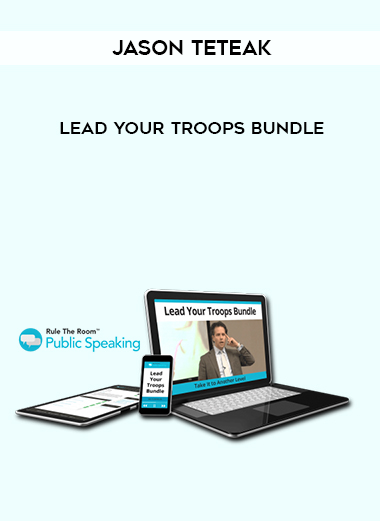
Christopher Willard – Mindfulness Certificate Course for Treating Kids
Salepage : Christopher Willard – Mindfulness Certificate Course for Treating Kids
Archive : Christopher Willard – Mindfulness Certificate Course for Treating Kids Digital Download
Delivery : Digital Download Immediately
Kids and teenagers are under tremendous stress and strain in today’s fast-paced, connected, and highly charged environment.
Youth require lifelong skills to cope with an increasingly demanding society, battle illnesses, and build thoughtful and compassionate living.
Dr. Christopher Willard, Psy. D., one of the world’s leading specialists on mindfulness approaches for adolescents and teens, will be teaching a new certificate course on Mindfulness interventions for treating kids and teens.
This online course will deepen your mindfulness practice and provide you the tools you need to share and adapt mindfulness for adolescents in practical and interesting ways.
You’ll discover tactics and techniques for improving social-emotional resilience and executive function, as well as proven therapies for ADHD and emotional regulation, as well as effective therapeutic skills for healing trauma and anxiety.
This course will culminate in a Certificate in Mindfulness Interventions for Treating Children and Adolescents! You’ll be re-energized and ready to grow your profession while also improving the general health, well-being, and happiness of today’s youngsters.
Christopher Willard, Psy. D., will lead you step-by-step through nine modules of in-depth Mindfulness training in this comprehensive online program, all designed to help you effectively integrate Mindfulness into your work with kids and teenagers. Each module covers the following topics:
Mindfulness and Neuroscience in the Development of a Healthy Brain
What is mindfulness, and how can we comprehend and communicate it with children? In Module 1, we will investigate:
Mindfulness and the biology of brain development
The straightforward science of how mindfulness prevents depression, PTSD, anxiety, and violence. Exciting and practical exercises to investigate the mind-body relationship.
How to utilize the breath to “control” our brains, bodies, and emotions.
Mindfulness for Self-Compassion, Appreciation, and Relaxation
Module 2 focuses on mindfulness for professionals in order to retain present, handle the stress of a demanding work, and avoid “compassion fatigue.”
Why mindfulness will help you be a better therapist, teacher, parent, and person
Sharpen your clinical intuition using presence, countertransference, and decision-making skills.
Compassion for oneself, appreciation, and relaxation activities to prevent burnout
Concentration exercises that keep your mind aware, awake, and alive
Techniques for being calm, connected, and creative throughout your sessions.
Managing the Mental Health Crisis in Youth
Module 3 will help you grasp what mindfulness is and isn’t while working with children and families experiencing a mental health crisis.
Why is mindfulness being practiced now? in dealing with the mental health crises
Simple analogies to describe what mindfulness is and isn’t How to help kids and families slow down, sit quietly, and focus on one thing at a time
Dealing with uncertainty, whether it’s your own, that of your coworkers, or that of your children
Anxiety, ADHD, and Impulse Control: Mindful Body Awareness
Module 4 teaches you how to use your body as a source of learning and healing. You’ll learn how to:
Assist children in integrating their mind and body in order to enhance their health, mental wellness, and learning.
Make mindful movement and walking enjoyable, humorous, and engaging!
Mindful eating – Beyond the raisins, real-world ideas and insights for anxiety, sadness, ADHD, impulsive management, and more
Neuroplasticity: Changing the Brain and Behavior
Neuroscience and neuroplasticity advances confirm the efficacy of mindfulness-based therapies. Module 5 will examine:
Brain and behavior transformation can be empowered by simplifying neuroscience for children.
Mindfulness, mental wellness, and learning are all intertwined. The current state of research.
Mind-body practices are being used to reprogram young brains for resilience.
From Resistance to Resilience: Engaging and Exciting Children
With the ideas and tactics taught in this session, you may transform opposition and resistance into openness and involvement. You will discover:
Ideas that are practical and successful in gaining children’s support
Master tips for increasing your confidence when teaching mindfulness
How to make mindfulness enjoyable and accessible to children who are worried, nervous, sad, or preoccupied
Mindfulness may be easily adapted to many types of minds, bodies, and backgrounds.
Mindfulness Integration with CBT, DBT, ACT, and Play
Create a toolset for dealing with children of all ages! Module 7 contains therapeutic approaches to use with children beginning with your next therapy session.
Empower children to recognize and manage their emotions and impulses.
Integrate mindfulness with a variety of therapeutic methods, including DBT, ACT, CBT, and play.
Investigate and practice effective strategies for depression, trauma, anxiety, ADHD, addiction, and other issues.
Create a clear mindfulness-based therapy treatment strategy.
Make Mindfulness Exciting! Arts, games, sports, and other activities
Investigate novel methods to incorporate mindfulness into the things that they are most interested in and enjoy. Module 8 explains how to:
Incorporate mindfulness into activities for children who struggle with focus.
Make your own visions with your children.
Make the virtual virtuous by using technology with care.
The more the merrier (or more mindful?) Practices in small groups and with partners
Mindfulness and Compassion in Action
In this final module, learn additional compassion based-practices, plus ways to cultivate mindful and compassionate workplaces, schools and communities. This module provides:
- A roadmap for breaking through resistance
- Strategies for finding time in busy lives for mindfulness practice and self-compassion
- Inspiring and time-tested ideas for creating a mindful and compassionate workplace, school, or family
About the Course Expert:
Christopher Willard, Psy. D., is one of the world’s leading experts on mindfulness with young people, having trained thousands of professionals and young people on the practice and benefits of mindfulness. He is a psychologist and consultant based in Boston, working individually as well as consulting to schools, hospitals and other organizations. Additionally, he is the author of multiple books on psychology, child development, contemplative practice and more. Dr. Willard is the president of the Mindfulness in Education Network and serves on the board of directors at the Institute for Meditation and Psychotherapy. In addition to serving on the faculty of Harvard Medical School, Dr. Willard leads courses and workshops around the world and online. You can find his website at drchristopherwillard.com, where you can watch his TEDx talks and learn more about his books and work. Dr. Willard is the author of Child’s Mind (2010), Growing Up Mindful (2016) and three other books. He is the co-author of the bestselling card decks Growing Mindful and Growing Happy.
Speaker Disclosures — Financial: Christopher Willard maintains a private practice. He receives royalties as an author for New Harbinger Publishing, Guilford Press, and Parallax Press. Dr. Willard is the president of the Mindfulness in Education Network. He is on the board of directors at the Institute for Meditation and Psychotherapy and is faculty of Harvard Medical School. Dr. Willard receives a speaking honorarium from PESI, Inc. Non-financial: Christopher Willard has no relevant non-financial relationship to disclose.
More from Categories : Health & Fitness



![[Audio Only] IC94 Keynote 03 - OUT OF MY MIND AND YOURS - Bernie Siegel](https://illedu.com/wp-content/uploads/2021/07/MrI_A_JRMkeje763RUZqjg-200.jpg)










Reviews
There are no reviews yet.